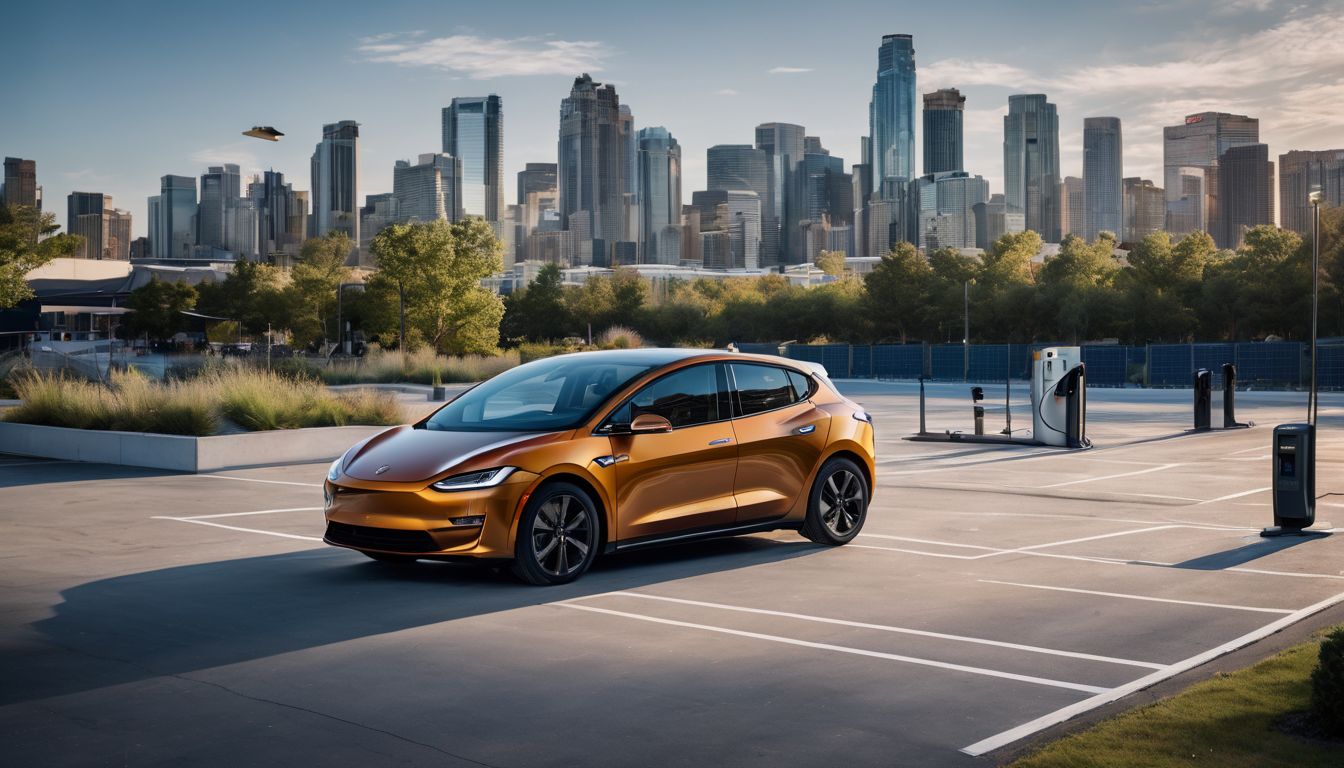We’ve all had that moment of wincing as the numbers spin ever higher at the petrol pump, each click a sharp reminder of our dwindling bank accounts. Like many of you, we’re on the hunt for ways to navigate these times in a more sustainable fashion without feeling like our wallets are constantly under siege.
Our sleuthing has uncovered some rather encouraging news: governments across the globe are putting their weight behind eco-friendly vehicles – a strategic move that’s poised to offer us some much-needed environmental and financial respite.
Let’s embark on this exciting exploration together, towards a future where our roads are less choked with pollution and our finances breathe easier too!
Key Takeaways
- The government offers tax rebates and reduced vehicle registration rates, encouraging consumers to buy electric and hybrid cars. They also set strict emission standards for manufacturers to follow.
- Grant schemes support the advancement of green technology in the automotive sector, with subsidies for businesses investing in electric vehicle fleets.
- Charging infrastructure is becoming more accessible thanks to grants that help local authorities install charging points, making it easier for people to own and use electric vehicles.
- Government policies are working towards phasing out diesel and petrol cars by setting future bans on their sale, showing a commitment to renewable energy in transportation.
- A collaborative approach between private companies and governments expands incentives beyond purchasing into usage of eco-friendly cars, such as offering discounted parking.
The Rise of Electric Cars
Government incentives and regulations have played a significant role in the increasing adoption of electric cars. The private sector has also been actively involved in developing and promoting eco-friendly vehicles.
Government incentives and regulations
We understand the urgent need for sustainable transportation. Our actions outline a clear path towards promoting eco-friendly cars.
- We offer tax rebates and reduced rates on vehicle registration for buyers of electric and hybrid vehicles. This encourages consumers to choose more environmentally friendly options.
- Regulations set strict emissions standards, pushing manufacturers to produce cleaner cars. These regulations help reduce the carbon footprint of new vehicles on the road.
- Grant schemes provide funds for research and development of green technology in the automotive industry. Through this support, we drive innovation in electric car design and function.
- We have introduced subsidies for businesses that invest in electric vehicle fleets. This move accelerates the shift towards eco-friendly transportation within commercial operations.
- Low-emission zones in city centres penalise high-polluting vehicles, encouraging adoption of cleaner alternatives. These zones improve air quality and promote public health.
- Green public procurement programmes prioritise buying eco – friendly cars for government use. Our purchases demonstrate commitment to leading by example in sustainable mobility.
- Policies are being crafted to phase out diesel and petrol cars by setting future bans on their sale. This long-term strategy signals a shift towards renewable energy sources in the automotive sector.
- Charging infrastructure is supported through grants, making it easier for local authorities to install charging points. Accessible charging stations make electric car ownership more convenient.
- In collaboration with private entities, we work towards expanding incentives beyond purchase into usage, such as discounted parking for electric vehicles. This collaborative effort creates an integrated approach to boosting electric car adoption.
Private sector involvement
Private sector involvement is crucial in driving the widespread adoption of eco-friendly cars. Companies play a pivotal role in developing and implementing electric vehicle infrastructure, from building and maintaining charging stations to manufacturing innovative battery technology.
Additionally, private enterprises contribute to the growth of sustainable fuel usage by investing in research and development for efficient energy storage solutions. Furthermore, collaboration between private businesses and the government ensures that incentives for hybrid and electric vehicle adoption reach a wider audience, making environmentally friendly transportation more accessible to consumers.
Expanding subsidies and incentives through collaborative efforts between the public and private sectors will be vital to accelerating the transition towards eco-friendly transportation.
The Importance of a Charging Infrastructure
Government initiatives and policies drive the development of a charging infrastructure for electric vehicles, ensuring that drivers have access to convenient and reliable charging stations.
Utilities also play a vital role in the expansion of this infrastructure, while private sector participation further enhances accessibility for eco-friendly transportation options.
Government initiatives and policies
The government plays a crucial role in promoting eco-friendly cars through its policies and initiatives. Here are some key actions taken to support environmentally friendly vehicles:
- Implementing subsidies and tax incentives to encourage the purchase of electric vehicles, making them more affordable for consumers.
- Setting targets and regulations to reduce greenhouse gas emissions from the transportation sector, driving the adoption of low-emission vehicles.
- Investing in research and development for advanced vehicle technologies, fostering innovation and continuous improvement in eco-friendly transportation.
- Collaborating with local authorities to develop charging infrastructure, ensuring convenient access to charging stations for electric vehicle owners.
- Establishing grants and funding programmes to support the expansion of public transportation systems and promote sustainable mobility options.
- Enforcing stringent emission standards for traditional fuel vehicles, incentivising the transition towards cleaner alternatives like electric cars.
- Engaging in international partnerships and agreements to collectively address environmental challenges and promote sustainable transportation solutions.
Role of utilities
Having discussed the government’s initiatives and policies for promoting electric vehicles, let us now delve into the role of utilities in facilitating the transition towards eco-friendly transportation.
Utilities play a crucial part in developing the necessary infrastructure to support electric vehicle deployment. This involves establishing a network of charging stations across cities and highways to ensure convenient access for electric car owners.
Additionally, utilities are also involved in integrating renewable energy sources to power these charging stations, contributing to lower carbon emissions and sustainable transportation.
Furthermore, utilities collaborate with government agencies and private sector stakeholders to innovate new technologies that improve battery storage, grid reliability, and smart charging solutions.
Private sector participation
Private sector participation plays a crucial role in the development of eco-friendly transportation. Companies invest in research and development for innovative technologies that contribute to more sustainable vehicles.
They also collaborate with the government to build charging infrastructure and promote electric cars, aligning with policies to reduce carbon emissions.
Manufacturers constantly improve vehicle efficiency, battery technology, and charging systems, while energy companies develop smart grids and renewable energy sources for powering electric vehicles.
Economic and Environmental Benefits of Electric Vehicles
Electric vehicles offer a significant reduction in greenhouse gas emissions and are cost-effective for consumers due to the lower maintenance and fuel costs. This makes them an attractive option for environmentally conscious individuals seeking sustainable transportation solutions.
Reduction of greenhouse gas emissions
To reduce greenhouse gas emissions, we must embrace electric vehicles and support government initiatives that promote their use. By transitioning from traditional fuel-powered cars to electric vehicles, we can significantly lower carbon emissions and help combat climate change.
Government policies that incentivise the adoption of electric cars play a crucial role in reducing the overall environmental impact of transportation. These measures encourage consumers to make greener choices and contribute to a more sustainable future.
Furthermore, the implementation of stricter regulations on vehicle emissions will push for widespread adoption of eco-friendly transportation options. By promoting alternatives such as electric vehicles through progressive public policies, governments can effectively work towards reducing air pollution and mitigating the effects of climate change.
Cost savings for consumers
Consumers can benefit from significant cost savings when switching to eco-friendly electric cars. With lower fuel and maintenance costs, electric vehicles offer a compelling economic advantage over traditional gasoline-powered cars.
Additionally, government incentives and subsidies further reduce the financial burden of purchasing an electric vehicle, making it a more attractive option for environmentally conscious individuals seeking to support sustainable transportation initiatives.
Moreover, the long-term investment in an electric car pays off as drivers save on fuel expenses due to significantly cheaper electricity rates compared to petrol or diesel. This financial advantage demonstrates how government policies and private sector innovations contribute to promoting eco-friendly transportation while also providing practical benefits for consumers.
The Future of Electric Cars and Government Policy
The future of electric cars and government policy involves net-zero pledges, electrification targets, and expanding subsidies and incentives for eco-friendly vehicles. Collaboration with the private sector for infrastructure development is essential to address the challenges and opportunities in promoting sustainable transportation.
Net-zero pledges and electrification targets
- Governments are setting ambitious targets to reach net-zero emissions by a certain year, promoting the adoption of eco-friendly cars.
- These targets drive the development and deployment of electric vehicle infrastructure, such as charging stations and battery technologies, supported by government funding.
- Initiatives focus on increasing the percentage of electric vehicles on the roads, thereby reducing reliance on traditional fuel-powered cars.
- Collaborative efforts with private sectors are key in achieving these targets, fostering innovation and investment in green transport technologies.
- The commitment to electrification targets drives research and development for advanced battery storage solutions, ensuring long-term viability and efficiency of electric cars.
- By setting clear goals for electrification targets, governments encourage investment in renewable energy sources that power electric vehicles.
Expanding subsidies and incentives
To support the adoption of eco-friendly cars, the government will expand subsidies and incentives. Here’s how:
- Increase financial incentives for purchasing electric vehicles, such as grants or tax credits, to make them more affordable for consumers.
- Introduce rebates for installing home charging stations, encouraging widespread access to convenient charging options.
- Provide funding for research and development in electric vehicle technology to drive innovation and improve performance.
- Offer subsidies for businesses and local governments to invest in public charging infrastructure, expanding accessibility for all drivers.
- Implement reduced or waived registration fees for electric vehicles, reducing the overall cost of ownership compared to traditional cars.
- Collaborate with utility companies to offer time-of-use electricity rates that encourage off-peak charging, optimising energy usage and reducing costs for electric vehicle owners.
Collaboration with private sector for infrastructure development
The private sector plays a vital role in developing the infrastructure necessary for eco-friendly cars. Through collaboration with the government, private companies contribute to building charging stations and improving battery technology.
This partnership fosters innovation and investment in sustainable transportation, accelerating the adoption of electric vehicles. By working hand in hand, the government and private sector can address challenges associated with infrastructure development while creating opportunities for advancements in eco-friendly transportation.
Private sector involvement is crucial for fostering an environment that supports the growth of electric vehicles. Collaborative efforts between businesses and governmental bodies drive innovation, expand accessibility to charging infrastructure, and further promote sustainable transportation solutions.
Challenges and opportunities for the future
Collaboration with the private sector for infrastructure development has laid the groundwork for an exciting future of electric vehicles. The challenges and opportunities ahead are vast but promising.
One significant challenge is ensuring accessibility to charging stations, particularly in rural areas where infrastructure lags behind urban centers. Addressing this gap presents a fantastic opportunity for public-private partnerships to invest in widespread charging networks, making electric cars a viable option for all.
Another key challenge lies in managing increased electricity demand as more cars shift to electric power. This necessitates innovative solutions from utilities and energy providers, presenting an opportunity for investment in renewable energy sources and smart grid technologies that can accommodate the added load on the grid efficiently.
Conclusion
In conclusion, government policies play a crucial role in promoting eco-friendly cars. These initiatives encourage the adoption of electric vehicles and establish the necessary infrastructure for their widespread use.
By providing incentives, setting regulations, and collaborating with the private sector, governments pave the way for a sustainable transportation future. The impact of these efforts not only reduces carbon emissions but also fosters innovation and economic growth in the green technology sector.
As we move forward, continued collaboration between governments and industry will be essential to address challenges and seize opportunities for a cleaner, more efficient transportation system.
FAQs
1. How does the government encourage people to drive eco-friendly cars?
The government promotes sustainable transportation by setting regulations, providing incentives for alternative fuel vehicles and supporting electric car infrastructure development.
2. What are public policies doing to support environmentally friendly vehicles?
Public policies include initiatives like giving tax breaks on low carbon emissions vehicles and funding research into new eco-friendly technology.
3. Can you tell me about any partnerships between the private sector and government for green transport?
Yes, there are collaborative efforts where governments work with private companies to expand electric vehicle use and enhance charging station networks.
4. Are there any plans to stop diesel cars from being used?
Governments have put forth environmental policies which involve initiatives to ban diesel vehicles over time and promote cleaner electric alternatives instead.
5. Do these government actions really make a difference in saving fuel?
Absolutely, encouraging the use of electric vehicles through policy measures leads directly to reduced demand for fossil fuels and helps conserve energy sources.





